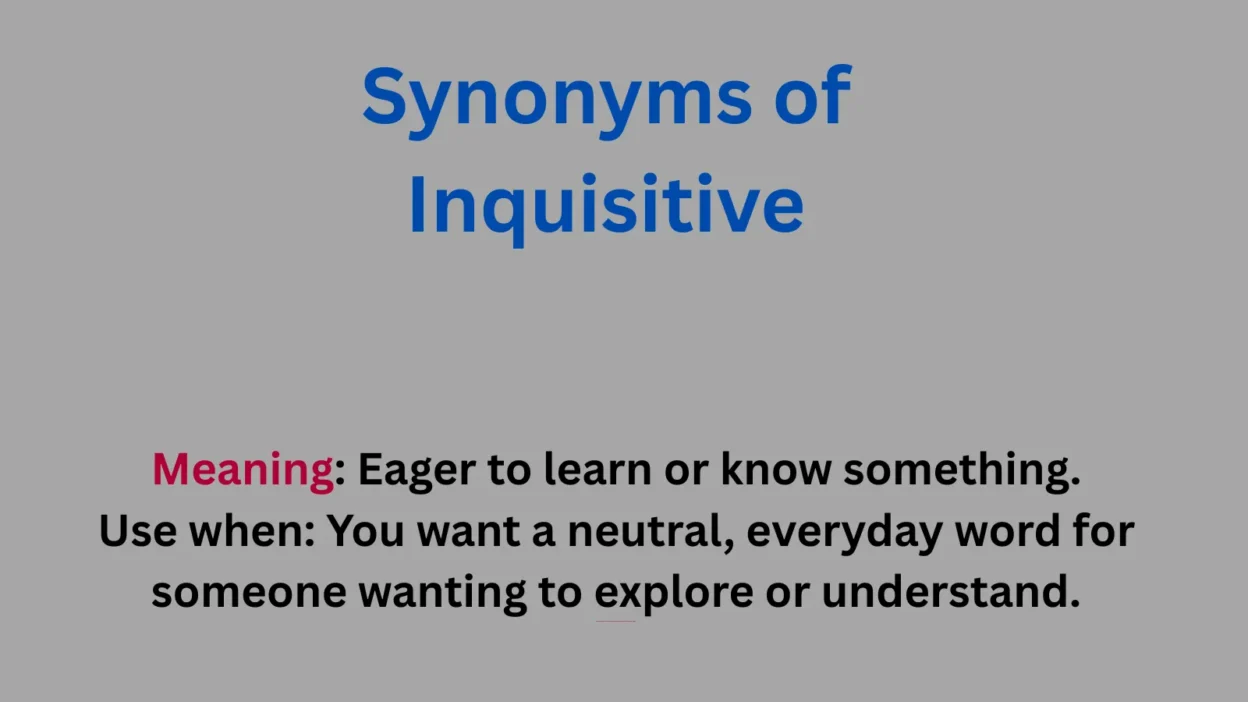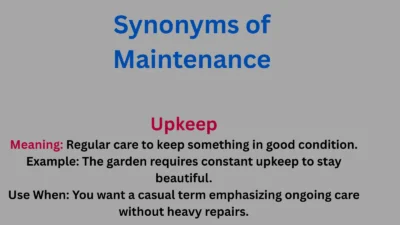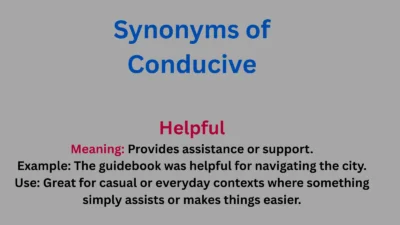Synonyms of inquisitive, such as curious, probing, questioning, and nosy, reflect different shades of a person’s desire to learn, explore, or dig deeper. For example, while “curious” might describe a child eager to learn, “probing” fits better when discussing a journalist seeking hidden truths. These words help you express the intensity, tone, and intent behind someone’s interest, whether it’s innocent, intellectual, or intrusive.
From storytelling to daily conversations, choosing the right synonym of inquisitive adds precision and personality to your language. In this guide, we’ll explore a range of alternatives and when to use each to convey curiosity in all its forms.
If you’re crafting dialogue, writing descriptively, or simply expanding your vocabulary, the right word can make all the difference. Let’s dive into the language of curiosity and discovery.
What Does Inquisitive Mean?
At its core, inquisitive means having a strong desire to learn or know more. It’s about curiosity—sometimes innocent, sometimes intense, but always driven by a need to explore ideas, people, or the world around you.
Key nuances of inquisitiveness include:
- Curious but respectful: Often suggests asking questions without being intrusive or rude.
- Engaged: Shows active interest in understanding something better.
- Open-minded: Willing to discover new facts or ideas.
- Sometimes cautious: Can be gently probing rather than aggressively nosy.
It’s not about being shy, modest, or reserved—in fact, it’s often the opposite! An inquisitive person tends to be outgoing in their questioning, though not always pushy.
30 Synonyms of Inquisitive: Descriptions, Examples & When to Use Them
Here’s a handy list of synonyms, with explanations and examples. Each one has its flavor and best-fit scenario.
1. Curious
Meaning: Eager to learn or know something.
Use when: You want a neutral, everyday word for someone wanting to explore or understand.
Example: She was curious about how the ancient ruins were built.
2. Inquiring
Meaning: Thoughtfully seeking information or knowledge.
Use when: You want to sound polite and serious, often in formal or academic contexts.
Example: The inquiring student asked detailed questions about the experiment.
3. Nosy
Meaning: Overly interested in others’ affairs, sometimes annoyingly so.
Use when: Describing someone whose curiosity is intrusive or unwanted.
Example: Don’t be so nosy—some things are private.
4. Probing
Meaning: Asking questions deeply and thoroughly, sometimes to uncover hidden truths.
Use when: The curiosity is intense, focused on investigation or discovery.
Example: The detective’s probing questions revealed the truth.
5. Investigative
Meaning: Methodically looking for facts, often in a professional or journalistic way.
Use when: You want to highlight a systematic, detailed search for information.
Example: Her investigative reporting uncovered corruption in the city council.
6. Analytical
Meaning: Examining details carefully to understand or solve something.
Use when: Emphasizing logical, detailed questioning rather than casual curiosity.
Example: His analytical mind helped solve complex problems quickly.
7. Prying
Meaning: Intrusively curious mind, often without invitation.
Use when: The curiosity feels rude or invasive.
Example: She was annoyed by the prying questions about her personal life.
8. Questioning
Meaning: Actively asking questions to gain clarity or challenge ideas.
Use when: Highlighting a skeptical or critical curiosity.
Example: The questioning tone of the interview challenged the politician’s answers.
9. Searching
Meaning: Looking carefully for information or answers.
Use when: Emphasizing the ongoing or purposeful nature of curiosity.
Example: He was searching for clues to solve the mystery.
10. Exploratory
Meaning: Trying to discover or learn something new in an open-ended way.
Use when: The curiosity is tentative or experimental.
Example: The scientist conducted exploratory research on the new species.
11. Speculative
Meaning: Wondering or theorizing about possibilities without full evidence.
Use when: Focusing on curiosity that involves imagination or guessing.
Example: Her speculative questions about the future sparked lively discussion.
12. Eager
Meaning: Enthusiastically curious or excited to learn.
Use when: The curiosity comes with positive energy and anticipation.
Example: The eager child asked about every animal at the zoo.
13. Nosy Parker
Meaning: Informal, British slang for someone overly interested in others’ affairs.
Use when: Playfully teasing someone about their intrusive curiosity.
Example: Don’t be such a Nosy Parker!
14. Observant
Meaning: Paying close attention to details and surroundings.
Use when: Emphasizing curiosity through keen observation rather than questions.
Example: The observant traveler noticed small cultural differences.
15. Interested
Meaning: Showing attention or concern about something.
Use when: A mild, polite way to express curiosity.
Example: She was interested in learning about different cuisines.
16. Analytical
Meaning: Skilled in breaking down information to understand it fully.
Use when: Highlighting curiosity paired with logic and reasoning.
Example: His analytical questions helped clarify the confusing data.
17. Searching
Meaning: Trying to find information or meaning actively.
Use when: Emphasizing an ongoing quest for answers or understanding.
Example: The author was searching for inspiration for her next novel.
18. Inquiring Mind
Meaning: A person who naturally seeks knowledge and understanding.
Use when: Praising someone’s general intellectual curiosity.
Example: An inquiring mind is the foundation of a great scientist.
19. Meddlesome
Meaning: Unwanted or unnecessary curiosity, often interfering.
Use when: Criticizing someone who intrudes into matters that don’t concern them.
Example: His meddlesome questions annoyed the whole family.
20. Investigative
Meaning: Curious thoroughly and officially.
Use when: Talking about a professional or formal inquiry.
Example: Investigative journalists play a vital role in exposing the truth.
21. Nosey
Meaning: Variant spelling of nosy; intrusive curiosity.
Use when: Same as nosy, but more casual.
Example: She’s always been a bit nosey about our plans.
22. Skeptical
Meaning: Questioning the truth or validity of something.
Use when: The curiosity involves doubt or suspicion.
Example: The skeptical scientist questioned the results.
23. Probing
Meaning: Asking questions carefully and deeply.
Use when: Emphasizing investigative or in-depth curiosity.
Example: The interviewer’s probing questions revealed new facts.
24. Reflective
Meaning: Thinking deeply about something before asking or deciding.
Use when: Emphasizing thoughtful curiosity.
Example: She gave a reflective response to the complex question.
25. Intrigued
Meaning: Fascinated and curious to know more.
Use when: Highlighting emotional interest or captivation.
Example: He was intrigued by the mysterious story.
26. Analytical
Meaning: Emphasizing logical thinking in curiosity.
Use when: Using reason and detail to ask questions.
Example: Her analytical approach helped uncover inconsistencies.
27. Curious Cat
Meaning: Playful phrase for someone who is very curious.
Use when: Friendly or humorous contexts.
Example: Don’t be a curious cat, but what’s going on here?
28. Quizzical
Meaning: Showing puzzled or questioning curiosity.
Use when: The curiosity is mixed with surprise or skepticism.
Example: He gave a quizzical look when hearing the strange news.
29. Snoopy
Meaning: Similar to nosy; poking around where one shouldn’t.
Use when: Light-hearted or teasing contexts about intrusive curiosity.
Example: Stop being so snoopy and mind your own business!
30. Wondering
Meaning: Thinking about something with curiosity and a desire to know.
Use when: Emphasizing gentle, often positive curiosity.
Example: She was wondering about the meaning behind the painting.
How to Choose the Right Synonym
Picking the perfect synonym depends on the tone, context, and emotional nuance you want to convey:
- Positive, friendly curiosity? Use curious, eager, intrigued, or wondering.
- Serious, professional inquiry? Choose investigative, probing, analytical, or inquiring.
- Polite or formal? Inquiring or interested works well.
- Critical or doubtful? Try skeptical or questioning.
- Annoying or intrusive? Words like nosy, prying, meddlesome, or snoopy fit best.
- Playful or casual? Curious Cat, nosy Parker, or Snoopy can add humor.
Remember cultural differences too! For example, nosy Parker is common in British English but less so elsewhere.
Conclusion:
The range of synonyms of inquisitive gives you the flexibility to express curiosity in all its forms—from innocent wonder to intense investigation. Whether you’re describing a curious child, a nosy neighbor, or an insightful thinker, each word adds a distinct tone.
Using the right synonym helps you shape your message with greater precision and depth. As you continue writing or communicating, keep these alternatives in mind.
They not only enrich your language but also help you capture the true nature of curiosity. In the end, how we ask—and how we describe the ones who ask—can say just as much as the answers we seek.




